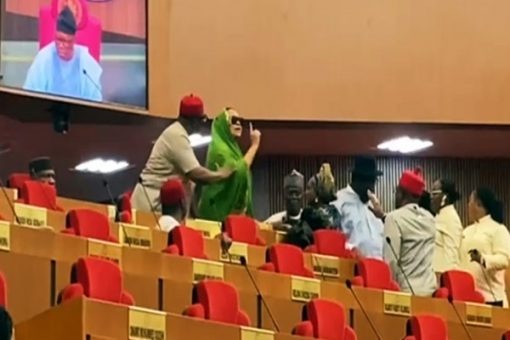Women Plan Protest Over Senator’s Alleged Harassment
 Fifteen states in Nigeria, including Abia, Rivers, Zamfara, and Kano, failed to elect any female representatives to their state Houses of Assembly during the 2023 General Elections. This alarming statistic was revealed by social inclusion and governance expert, Olumide Olaniyan, at a recent technical session in Abuja focused on the Seat Reservation for Women Bill and the National Women Leaders Forum’s Operational Guidelines.
Fifteen states in Nigeria, including Abia, Rivers, Zamfara, and Kano, failed to elect any female representatives to their state Houses of Assembly during the 2023 General Elections. This alarming statistic was revealed by social inclusion and governance expert, Olumide Olaniyan, at a recent technical session in Abuja focused on the Seat Reservation for Women Bill and the National Women Leaders Forum’s Operational Guidelines.
The event, organized by the Westminster Foundation for Democracy (WFD) and the National Women Leaders Forum (NWLF) of Political Parties in Nigeria, addressed the pressing issue of gender inequality in Nigeria’s political representation. Olaniyan highlighted that this lack of female representation spanned across the six geopolitical zones, listing additional states such as Osun, Imo, Yobe, Bauchi, Niger, Borno, Gombe, Jigawa, Kebbi, Katsina, and Sokoto.
Despite women making up 49% of Nigeria’s population, Olaniyan lamented that the country ranks 180th out of 192 nations in terms of female representation in government. He called for urgent reforms to rectify the systemic barriers that limit women’s participation in politics.
Deputy Speaker of the House of Representatives, Benjamin Kalu, who also attended the session, decried the underrepresentation of women in leadership positions, calling it a significant setback to the nation’s progress. Kalu stressed that Nigeria’s democracy remains incomplete as long as women continue to be sidelined in positions of power.
Kalu is sponsoring the Seat Reservation for Women Bill (HB1349), which aims to address this gender imbalance by ensuring women’s representation in both the National Assembly and at sub-national levels. He emphasized that the bill seeks to break down systemic barriers and create a legislature that truly reflects Nigeria’s diversity.
Amina Bryhm, President of the National Women Leaders Forum of Political Parties in Nigeria, and National Women Leader of the Peoples Democratic Party (PDP), also spoke at the event. She urged the National Assembly to pass the Special Seat Bill, emphasizing that women’s political underrepresentation is a critical issue that needs to be addressed without delay.
Meanwhile, women across Nigeria have pledged to march to the National Assembly to demand answers from Senate President Godswill Akpabio regarding the alleged mistreatment of Senator Natasha Akpoti-Uduaghan, who represents Kogi Central.
Ene Obi, the former Country Director for ActionAid Nigeria, strongly condemned the reported harassment of Senator Akpoti, calling it an unacceptable violation of her rights. She warned that women would not stand idly by and would take to the streets to demand a thorough explanation from Akpabio concerning the senator’s mistreatment.
The controversy began last week when the Senate session erupted in chaos after Senator Akpoti-Uduaghan, who chairs the Senate Committee on the Diaspora and Nongovernmental Organizations, protested the unauthorized relocation of her seat within the chamber. Her objections led to a standoff with Akpabio, who refused to acknowledge her concerns, further escalating the tension between the two.
This incident has sparked outrage among women’s groups, who view it as another example of the challenges women face in Nigeria’s political space.













